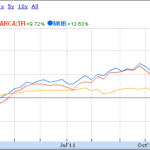During the recent financial collapse, the perpetual bears had their day, crowing about how they were right all along and the US was in for a cataclysmic crash. Their chorus grew especially loud during the March lows, which in retrospect was the worst time in decades to either sell your long positions or enter into a bear market fund. Aside from looking at recent history for their failures, let’s consider the broader liabilities of investing in a bear market fund moving forward:
- You Can’t Time the Market: It’s been demonstrated time and time again that no known investor, let alone retail investor, can predict market direction with any great certainty. Day traders and quants can exploit instantaneous anomalies in market pricing and momentum, but as far as a buy-and-hold investor being able to pick a particular period where it’s good to be long and good to be short, history has not supported such an ability. Otherwise, they’d be running a hedge fund generating triple digit returns annually in any market. For all the progress we’ve made in quantitative modeling, flash trading and hiring the best and brightest minds from MIT to work on Wall Street, the hedge fund industry is actually coming off the worst quarter of the decade (BusinessWeek).
- The Market Can’t Drop Below Zero: While you can double, triple and quadruple your money over time in any investment if you hang on to it long enough and it follows a historical uptrend, let’s say you pick the pivot top of a market for a given time period and invest in a bear fund. The best you can ever do is approach a 100% return. You can never exceed 100%. So, what then? If you believe the Dow is going to drop to below 1,000 in a total economic apocalypse, what then? Mortgage the house and bet that it will drop further to Dow 100? It’s basically the end of the road, aside from the fact that it will not happen short of a nuclear holocaust.
- You Could Do This Yourself: If you’re intent on being short the market, or even hedging a broader portfolio, why would you rely on a higher-priced fund with no real-time disclosure rather than just taking up short positions yourself. There’s everything from using put option strategies to shorting stocks to shorting leveraged ETFs for the most aggressive of risk seekers. There are some very aggressive leveraged short ETFs as well. For maximum volatility, there are the following 3X daily reset leveraged variety: Direxion Financials Bear 3x ETF (FAZ), Direxion Small Cap Bear 3x ETF (TZA), Direxion Technology Bear 3x ETF (TYP), Direxion Emerging Markets Bear 3x ETF (EDZ), and Direxion Real Estate Bear 3x ETF (DRV) – not only do these combine 3X daily leverage, but the underlying sectors are more volatile than broad market indices like the S&P500. But you can do these tailored to your own needs and without annual fees (albeit commissions), as opposed to banking on the right calls being made by fund managers.
- Performance Isn’t Impressive: Let’s consider a prominent bear fund – Federated Prudent Bear (BEARX). While it got clobbered coming off the March 2009 lows and stands at -32% vs. a gain of 57% for the S&P500 (SPY), that is to be expected. However, in looking at periods where you would have expected strong performance, it’s just not impressive either. This year for instance, SPY is down for the year by about 3% – well so is BEARX – down 2% as well. So, what are you paying for? For a fund that’s supposed to thrive in a down market, with the flexibility to shift in and out of various assets and cash, you’d think it would at least be positive on the year. And don’t even get me started on holding leveraged ETFs for long periods of time. Even holding a bear market ETF while the market declines doesn’t guarantee you’ll make any money due to the mathematical certainty of value decay I routinely warn about.
While many of the bear funds will purport to have asset class diversification, know when to get in and out of cash vs. shorting stocks, etc., I just haven’t seen evidence that these funds can or will outperform the market in the long-term. And if the thinking is that they will outperform in a down market (which they’d better with a name like that), then what are the odds you, as a retail investor, can time when to enter and exit the fund? As I mentioned above, it’s almost 90% in the timing of entry/exit and a small portion of what the actual short positions are that will dictate success or failure. Investing for income vs. capital appreciation is one thing, but trying to distinctly time the market by entering and exiting a bear fund, on top of anticipating that the fund manager will time it right as well…is an exercise in futility.
This is not to say that the only direction for the market is up, and frankly, I’m surprised it’s held up as well as it has with credit availability unlikely to improve in the face of the worst FICO Score report we’ve ever seen indicating now fully 1/4 of all Americans are below 600, but who’s to say that’s not already baked into current equities prices and from here, we’re just as likely to move up as we are down? The point is that over the long term, you’re much more likely to make money long then you are short. If you’re that concerned over the direction of equities, perhaps stocks aren’t for you and safe passive investments should be the sole components of your portfolio.
Disclosure: No long position in any investments covered in this article. Author is short multiple leveraged ETFs in pairs trades including: FAZ, TYP and DRV.











{ 1 comment… read it below or add one }
I have always suspected what you just posted, that bears make a lot more noise than money. Every time the market tumbles, they come out of hibernation roaring about how smart they are. But, when the market is up 10% for the year, you never hear from them. These people are like the gambler who tells you how much money they just won, but never mention how much they have lost over the years.
Since the long-term direction of the market is up, it’s like a losing proposition to take a continuous short position.
{ 2 trackbacks }